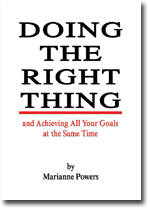Chapter 3
What we think and feel are not choices that we make and we are not accountable for them. Our thoughts and feelings don’t affect other people unless we put them into words or actions. It’s true that thinking and feeling usually (hopefully) come before speaking and doing. Still, we have many thoughts, but we don’t say them all. We have many feelings, but we don’t act on them all.
We share our thoughts and feelings with people who care about us and our well-being. We can talk it over and they can help us figure out what makes us feel that way. We can consider whether there is a different way to look at the situation or what options we have. We tell other people our thoughts and feelings when we want their understanding or assistance.
No one has a right or responsibility to demand to know or try to guess what we are thinking or feeling in order to criticize, condemn, or punish us. There are no thought police. There might be some “what I think you are thinking” police, but that is wrong on two counts -- because we shouldn’t be held accountable for what we think and because nobody knows what we’re thinking.
Thoughts come from everything we’ve ever learned and everything we’ve ever experienced. We combine them with new learning and new experiences and even with things we’ve only imagined.
We think about all the possibilities and what the results might be. We remember what happened before and what we have heard happened to other people. We think about what effect our actions will have on other people and make the proper adjustments in order to do the right thing and achieve all our goals. We believe something is possible and are inspired to make it happen. We know there is danger and guard against it. We make Plan A and back it up with Plan B.
We can indulge in ridiculous and incredible thoughts to keep our minds wide open and exercise our imagination and creativity. Angry feelings and aggressive thoughts can play themselves out in fantasy in our minds. We can enjoy for a minute or two the imagined discomfort of those who have hurt us, intentionally or not, without any harm to ourselves or them.
We need to allow all this for ourselves and for everyone else. Everyone can think whatever comes into their heads. No one can stop us from thinking anything at all; nor can we stop anyone else -- even if we do say sometimes, “Don’t even think about it!”
We are not accountable for our feelings. Feelings come from everything we’ve learned and everything we’ve experienced and are necessary for us to do the right thing and accomplish all our goals. Feelings are what make doing the right thing and accomplishing goals enjoyable. People talk about “controlling” our feelings or our emotions, as if we could keep from having them. We can’t. We can control our words and our actions. We can choose not to speak from our emotions, we can choose not to act on our feelings.
At least in my case, feelings are not always a positive basis for action. I disliked a woman once, just because she reminded me of someone else. I have also loved people dearly who didn’t love me back or have my best interest at heart. I don’t worry about those feelings anymore. They just are. I might wonder about them, where they come from, but no one can demand an explanation of me. It’s my mystery to figure out or not. I just know that before I speak or act, I have to have more to go on than feelings. I have to have figured out whether what I say or what I do is right and whether it helps me achieve my goals.
If someone does tell us what they think or feel, or if we tell them, it doesn’t do any good to deny or reject them. Hearing, “You shouldn’t think like that” doesn’t keep it from happening. Telling someone, “You shouldn’t feel that way” doesn’t change how they feel. And, if that’s what we get, why would we reveal our thoughts or feelings?
Of course, people can change their minds or their feelings might be different if they get more information, have new experiences, or see a different way of looking at something. If someone tells us what they think or feel, we can tell them, show them, or explain, and that could happen. Or they might do that for us. But that’s a choice that people make -- whether to tell someone else what they think or feel.
We all have a lot of different thoughts and feelings about a lot of different things. We are not accountable to anyone for what comes and goes in our heads, for what comes and goes in our hearts, nor is anyone else accountable to us. No one has the right to know what we are thinking or feeling unless we choose to tell them. No one has the right to know or judge anyone else’s thoughts or feelings.



0 Comments:
Post a Comment
<< Home